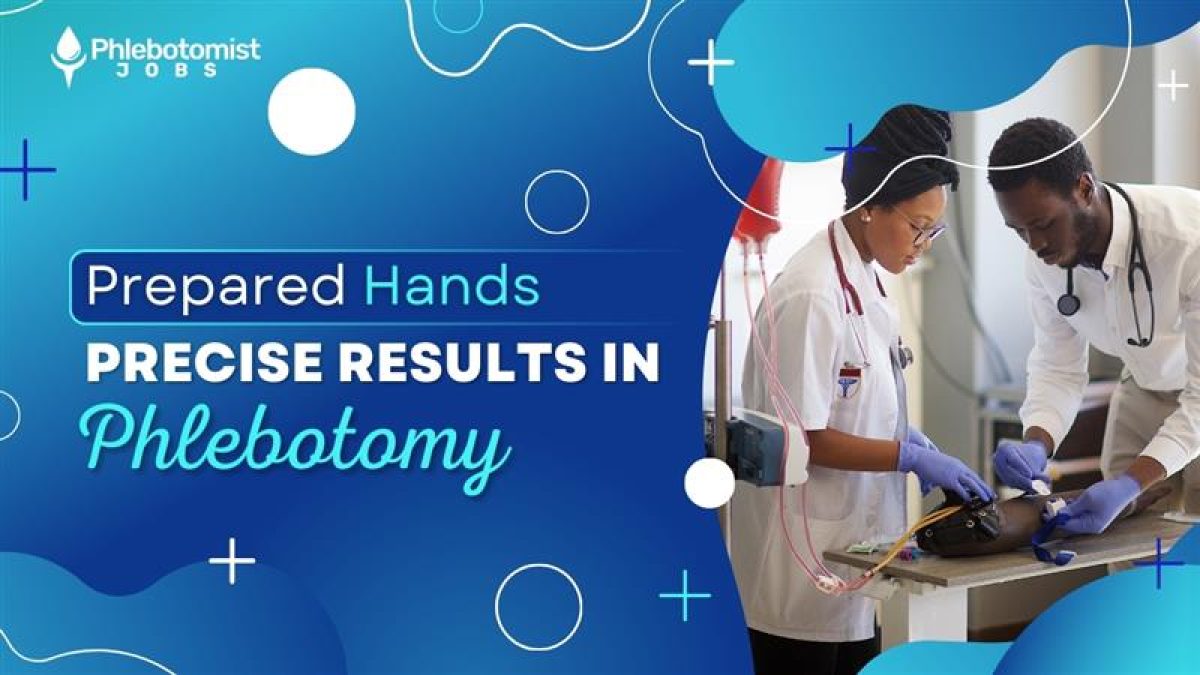Table of contents ▸
Phlebotomy is one such important specialty that is a lucrative sector for those gifted in blood drawing and patient care. As the demand for such jobs as phlebotomists increases, a lot of budding professionals wonder if there is a National phlebotomy certification that increases their chances. This blog delves into the landscape for National phlebotomy certification, its relevance, who offers it, and how it can open up Phlebotomy Opportunities. You might be either a newcomer seeking to gain experience or a credentialed phlebotomist in search of higher learning; either way, a good grasp of certification options is crucial.
Understanding National Phlebotomy Certification
A National phlebotomy certification is a credential awarded by recognized organizations to validate a phlebotomist’s skills and knowledge. Unlike state-specific licenses, a National phlebotomy certification is widely recognized across the US and thus is a great advantage for anyone seeking a phlebotomy job in several regions. Certification identifies one as being competent in venipuncture, patient interaction, and safety procedures – all of which are essential for a phlebotomy job in hospitals, clinics, and laboratories.
A number of reputable organizations confer National phlebotomy certification, each with its own set of requirements and procedures for certification. Although not obligatory in all states, such certifications greatly increase one’s ability to get a job and provide credibility.
Key Organizations Offering National Certification
Multiple organizations provide National phlebotomy certification, each with unique eligibility criteria and examination formats. The main certifying organizations include:
National Healthcareer Association (NHA)
The NHA offers the Certified Phlebotomy Technician (CPT) credential, which is one of the most widely recognized certifications for phlebotomist positions. To obtain this certification, candidates must attend an accredited training program and successfully pass an exam, which comprehensively covers blood collection techniques, infection control, and other related areas.
American Society for Clinical Pathology (ASCP)
The American Society of Clinical Pathologists is an organization that offers certifications for Phlebotomy Technicians (PBT), which enjoys a high degree of respect in the medical community. Education plus experience in combination qualify candidates. The ASCP certification is desirable for more Professional Phlebotomists who may be hoping to pursue positions in more progressive laboratory settings or pursue Phlebotomy Opportunities with premier employers.
American Medical Technologists (AMT)
The Registered Phlebotomy Technician (RPT) certification is offered by the AMT. The certification requires candidates to successfully complete training or have work experience that is equivalent. This is the certification to consider for a phlebotomist wanting to stand out in the highly competitive Phlebotomy Jobs market.
National Phlebotomy Association (NPA)
NPA provides a National phlebotomy certification offering special emphasis on hands-on skills and patient safety. This certification would be well suited for Phlebotomy Jobs in a variety of settings ranging from blood donor centers to private clinics. NPA also provides the means for Professional Phlebotomists to stay current with the industry changes.
In general, certifications awarded by these organizations require education, hands-on training, and a standardized exam. Deciding on the proper certification may depend on career goals and the kinds of phlebotomy-related opportunities that one wishes to pursue.
Why Get a National Phlebotomy Certification?
There are a number of advantages to being nationally certified in phlebotomy for individuals seeking jobs as phlebotomists. Here’s why it’s a worthwhile investment:
More Job Opportunities
There is a great demand for certified phlebotomists for Phlebotomy Jobs across the United States. Employers, like those found at Phlebotomist Jobs, almost always give more consideration to candidates who come with recognized credentials from the NHA, ASCP, or other credible organizations. Certification confirms to employers that you have the required skills and knowledge for Phlebotomy Jobs, switching from setting to setting within different healthcare settings.
Salary Advantage
Compared to non-certified phlebotomists, certified phlebotomists often earn more. Industry data shows the average hourly wage for certified phlebotomists is between $16 and $25, depending on the city and experience.
Professional Credibility
Having a National phlebotomy certification gives an edge in the professional landscape of phlebotomy services. It stresses your commitment to high standards of care and safety for clients, which is highly necessary for Phlebotomy Jobs at reputable health care facilities. It also provides a competitive edge when applying for phlebotomy positions with leading employers.
Flexibility and Mobility
Since the National phlebotomy certification holds recognized status all over the country, it enables Professional Phlebotomists to apply for work in other states without having to acquire more credentials for themselves.
The Process of Getting a National Phlebotomy Certification
Several steps lead toward accomplishing a National phlebotomy certification. Here’s a checklist of things to keep you on track over this journey:
Complete an Accredited Training Program
Most certifying agencies require candidates to undergo phlebotomy training from an accredited training program, one that could be accredited, for instance, by the National Accrediting Agency for Clinical Laboratory Sciences (NAACLS). These programs are offered by vocational schools or community colleges and teach subjects considered essential, such as anatomy and venipuncture techniques, as well as patient interaction. Training programs work as a springboard towards opportunities in phlebotomy, as well as preparing one for the certification exams.
Obtain Practical Experience
Experience is necessary for a phlebotomy job and certification. A significant number of these programs include clinical internships where you will learn through drawing blood under supervision. Some certifications require not only blood drawing under supervision but also a minimum number of successful venipunctures and capillary draws from a pool of certifying organizations, one being the ASCP PBT.
Pass Certification Exams
After finishing the training and obtaining some experience, the next stage involves passing your organization’s certification examination. These exams explore what you study concerning phlebotomy techniques, safety protocols, and patient care. Definite successful opportunities for phlebotomists come from intense preparation for the examination using study guides and practice exams.
Maintain Your Certification
Most National phlebotomy certifications require you to renew every year or two. Renewal requires continuing education credits or retaking examinations to maintain current status. Keeping your certification active allows you to compete in Phlebotomy Jobs and maintain your position as a Professional Phlebotomist.
Conclusion
A National phlebotomy certification provides the perfect gateway for employment or promotion to positions along the phlebotomy spectrum. The credential with its endorsement from honourable organizations like the NHA, ASCP, AMT, or NPA stands as proof of one’s being skilled in the area and committed to excellence in the field. Having a credential is a great way to get hired, and that credential will transfer to any tube drawing opportunity in the United States. Whether you are starting fresh or taking a leap into a higher position, an investment in National phlebotomy certification is a viable step toward fulfilling work that matters in healthcare.
Follow us on Social Media: LinkedIn | Facebook | Twitter | Instagram












